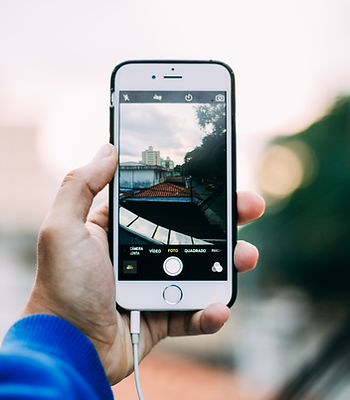
Many students have a lot of questions about London, and this page will act as a list of items you should consider in preparing for the trip. If you have other questions related to the trip, email Professor Laura Powell at Powelll5@xavier.edu.
Traveling to London and Paris
Q: Will I need a passport or visa?
A: Beginning in 2025 you will need both a valid passport, (it must be valid for at least six months after our return date), and new requirement - a VISA, costing approximately $7.00. Click here for a link to the VISA application. If you don’t already have a passport, you should start the process RIGHT AWAY! Here’s the government website to get started. Non-U.S. citizens may need to obtain a Visa.
Q: What should I pack in my carry-on?
A: Rick Steves' #1 travel tip is to pack light. Although the airlines have generous allowances, you will have to deal with all your luggage once you land in London. For our flight from the USA to Heathrow, Delta allows you to bring one carry-on that weighs up to 40 pounds and an additional personal item (e.g. laptop or purse). Put any medications and valuables in your carry-on bag, and always assume that your checked bag will be lost in transit, so pack three to five days worth of clothes in your carry-on. Also pack any essential medicines, electronics, and any money in your carry-on bag.
Any liquids or gels you carry on must fit into ONE quart-sized ziplock bag. Each item in the bag must be smaller than 3 ounces or 100 ml. Regulations may change before we leave.
Q: What should I bring in my checked luggage?
A: You can check one 50 pound bag. Any bag weighing more than 50 pounds will cost extra, and a second bag will also cost extra. When packing, consider that you will probably return with gifts and souvenirs that will take up room on the way home.
Because our trip is in early spring, pack at least one fleece pullover or a sweatshirt, and a small umbrella. You might also consider bringing some type of outer shell or windbreaker that can protect you against both wind and rain. Also make sure to bring two pair of very comfortable shoes
We ask that you wear business casual at our briefings, but casual clothes are acceptable on free days.
Money

Q: How much money should I bring over from the USA?
A: We recommend bringing £50 to £100 for the first few days in London. The downtown Cincinnati branches of Fifth Third and US Bank have international desks that sell British pounds, but don’t wait until the last minute to exchange your money because they might run out. Although you can exchange money at the airport, the rates will be better at the banks’ international desks.
Q: How can I get money while in London and Paris?
A: The easiest way to exchange US dollars for British pounds and French Euro is through ATM machines. ATM cards that have “Cirrus” or “Plus” on the back typically will work in Europe, but you should contact your bank to confirm that your card will work on the trip, and if so, whether there is any special process for obtaining money. Also notify them that you’ll be traveling abroad and they should expect to see international charges on the card. Learn the numeric (instead of an alpha) PIN for your debit card because many European ATMs do not have letters on their keys.
Q: Can I use a credit card in London and Paris?
A:You may want to consider having a credit card, or two, for use in an emergency. Again, alert your bank(s) that you will have international charges on the card. Keep a copy of your card numbers and the ‘Lost Card’ 800 number.
For more information on money in London and Paris, click here.
Electronics
Q: Will my smartphone work in London?
A: Yes, but you need to talk to your service provider to avoid roaming charges. Students are required to have some type of data plan in order to communicate with each other and the professors during this trip. Talk to your service provider about the best way to add an international data plan during the week you'll be there. Most communication will be done through WhatsApp, which won't use a significant amount of data.
Q: How do I charge my electronics?
A: Some US electronics can automatically convert from European voltage (240v) to US (110v). Your device (e.g. laptop power supply or phone charger), must list both 240 and 110 on the power supply for this to work automatically. If it lists both, you will still need a British and a European adapter to fit in the different plugs. If your charger does not list both, YOU WILL FRY YOUR DEVICE if you try to use the appliance without a step-down converter.

Smart phones can be great for taking pictures, but make sure you keep an eye or hand on it at all times so it doesn't get stolen.
Trip Activities and Comfort
Q: How much money should I bring over from the USA?
A: We recommend bringing £50 to £100 for the first few days in London. The downtown Cincinnati branches of Fifth Third and US Bank have international desks that sell British pounds, but don’t wait until the last minute to exchange your money because they might run out. Although you can exchange money at the airport, the rates will be better at the banks’ international desks.
Q: How can I get money while in London and Paris?
A: The easiest way to exchange US dollars for British pounds and French Euro is through ATM machines. ATM cards that have “Cirrus” or “Plus” on the back typically will work in Europe, but you should contact your bank to confirm that your card will work on the trip, and if so, whether there is any special process for obtaining money. Also notify them that you’ll be traveling abroad and they should expect to see international charges on the card. Learn the numeric (instead of an alpha) PIN for your debit card because many European ATMs do not have letters on their keys.
Q: Can I use a credit card in London and Paris?
A:You may want to consider having a credit card, or two for use in an emergency. Again, alert your bank(s) that you will have international charges on the card. Keep a copy of your card numbers and the ‘Lost Card’ 800 number.
For more information on money in London and Paris, click here.